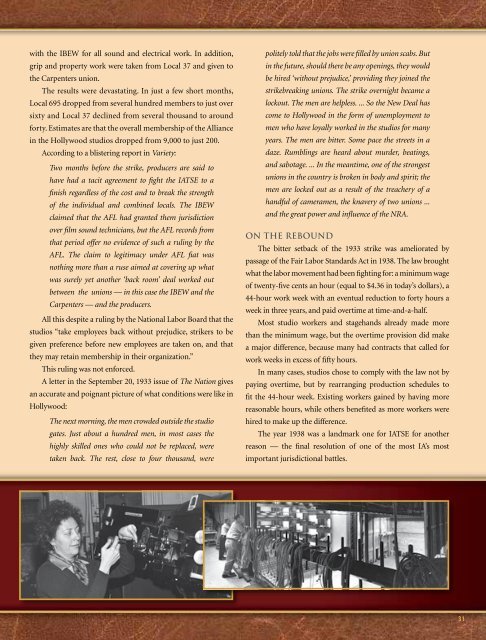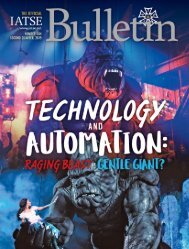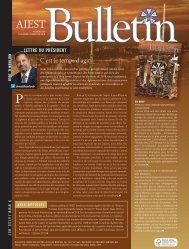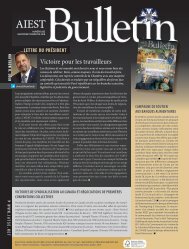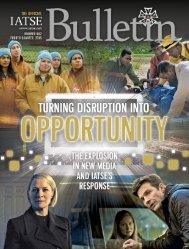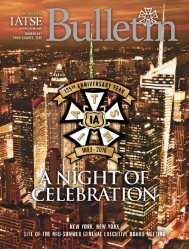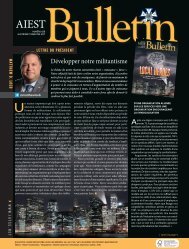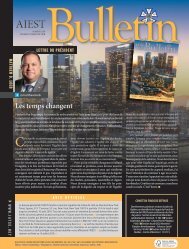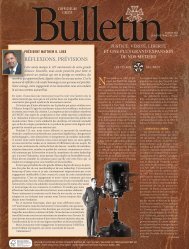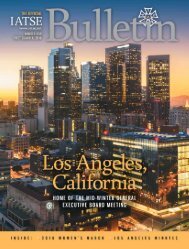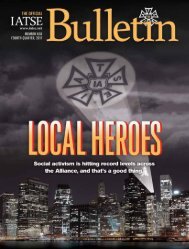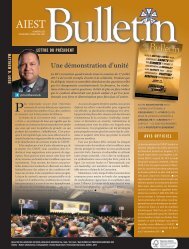IATSE-2nd2018_web
You also want an ePaper? Increase the reach of your titles
YUMPU automatically turns print PDFs into web optimized ePapers that Google loves.
with the IBEW for all sound and electrical work. In addition,<br />
grip and property work were taken from Local 37 and given to<br />
the Carpenters union.<br />
The results were devastating. In just a few short months,<br />
Local 695 dropped from several hundred members to just over<br />
sixty and Local 37 declined from several thousand to around<br />
forty. Estimates are that the overall membership of the Alliance<br />
in the Hollywood studios dropped from 9,000 to just 200.<br />
According to a blistering report in Variety:<br />
Two months before the strike, producers are said to<br />
have had a tacit agreement to fight the <strong>IATSE</strong> to a<br />
finish regardless of the cost and to break the strength<br />
of the individual and combined locals. The IBEW<br />
claimed that the AFL had granted them jurisdiction<br />
over film sound technicians, but the AFL records from<br />
that period offer no evidence of such a ruling by the<br />
AFL. The claim to legitimacy under AFL fiat was<br />
nothing more than a ruse aimed at covering up what<br />
was surely yet another ‘back room’ deal worked out<br />
between the unions — in this case the IBEW and the<br />
Carpenters — and the producers.<br />
All this despite a ruling by the National Labor Board that the<br />
studios “take employees back without prejudice, strikers to be<br />
given preference before new employees are taken on, and that<br />
they may retain membership in their organization.”<br />
This ruling was not enforced.<br />
A letter in the September 20, 1933 issue of The Nation gives<br />
an accurate and poignant picture of what conditions were like in<br />
Hollywood:<br />
The next morning, the men crowded outside the studio<br />
gates. Just about a hundred men, in most cases the<br />
highly skilled ones who could not be replaced, were<br />
taken back. The rest, close to four thousand, were<br />
politely told that the jobs were filled by union scabs. But<br />
in the future, should there be any openings, they would<br />
be hired ‘without prejudice,’ providing they joined the<br />
strike breaking unions. The strike overnight became a<br />
lockout. The men are helpless. ... So the New Deal has<br />
come to Hollywood in the form of unemployment to<br />
men who have loyally worked in the studios for many<br />
years. The men are bitter. Some pace the streets in a<br />
daze. Rumblings are heard about murder, beatings,<br />
and sabotage. ... In the meantime, one of the strongest<br />
unions in the country is broken in body and spirit; the<br />
men are locked out as a result of the treachery of a<br />
handful of cameramen, the knavery of two unions ...<br />
and the great power and influence of the NRA.<br />
ON THE REBOUND<br />
The bitter setback of the 1933 strike was ameliorated by<br />
passage of the Fair Labor Standards Act in 1938. The law brought<br />
what the labor movement had been fighting for: a minimum wage<br />
of twenty-five cents an hour (equal to $4.36 in today’s dollars), a<br />
44-hour work week with an eventual reduction to forty hours a<br />
week in three years, and paid overtime at time-and-a-half.<br />
Most studio workers and stagehands already made more<br />
than the minimum wage, but the overtime provision did make<br />
a major difference, because many had contracts that called for<br />
work weeks in excess of fifty hours.<br />
In many cases, studios chose to comply with the law not by<br />
paying overtime, but by rearranging production schedules to<br />
fit the 44-hour week. Existing workers gained by having more<br />
reasonable hours, while others benefited as more workers were<br />
hired to make up the difference.<br />
The year 1938 was a landmark one for <strong>IATSE</strong> for another<br />
reason — the final resolution of one of the most IA’s most<br />
important jurisdictional battles.<br />
31


